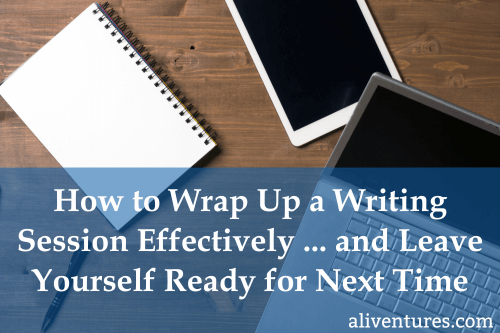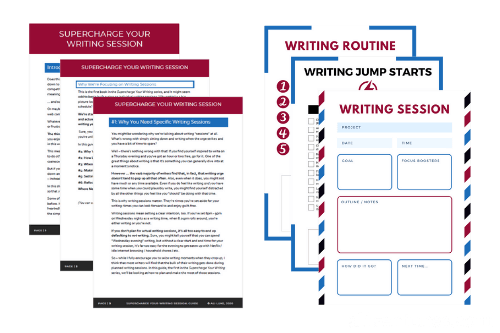How to Wrap Up a Writing Session Effectively – and Leave Yourself Ready for Next Time

You’ve probably given at least a little bit of thought to how you want to start a writing session.
Maybe you gather together specific writing supplies, like your pens and notebook. Perhaps you always play the same music to get you into the writing zone. You might always have a hot drink to hand, or even a favourite snack.
All those things can be great ways to signal the start of your writing time.
But what about the end of your writing session?
If you’re like me, and a lot of writers, you probably find that you often just stop. You hit your word count, you finish a section, or your timer goes off to remind you to start the next thing.
You might not pause, even for a few seconds, to wrap up your writing session.
That’s not a terrible thing! It’s far, far better to write and then leap straight on to your next task if the alternative is to not write at all. Sometimes, writing just has to squeeze in around the edges of everything else.
However, if you do this often, you might find it’s harder to get back into your writing next time you sit down to work on your project.
Wrapping up a writing session effectively doesn’t need to take long. I wouldn’t spend more than five minutes on this (unless it’s an unusually long writing session) … and you might spend literally seconds.
So let’s go through a few different ways to finish off your writing session. We’ll start with the super-quick ideas – even if you don’t have a whole minute to spare, these will work for you!
Really Quick Ways to Wrap Up Your Writing Session (10–60 Seconds)
Got only seconds to spare? Try one of these. If you’ve got nearer a minute, you might be able to fit in both!
1. Jot Down a Few Words About What You’ll Write Next
When you’re busy writing, you’ll often find that you’ve got a picture in your head of what’s going to come next. You’re not stopping after every single sentence to puzzle out what’s happening
But if you finish your writing session mid-paragraph when your time is up, you might come back the next day without a clue what was going to happen next.
Even if you think you’ll remember, take just a tiny bit of extra time at the end of your writing session to jot down a few words about what’s coming next.
This doesn’t have to be a lot – just enough to jog your memory.
During 2024, I’ve been writing 250+ words of fiction each day. Here’s how I finished my writing session yesterday. (Raw and unedited, excuse it being rather first-drafty!)
![Text in the image reads: And in that video was the transportation vehicle, with what had previously been the nicely anonymous PLUM AND GREENWOOD on the side. It could have been anything: a law firm’s mobile office, a decorator’s van full of equipment, even a hearse. Rachel said, “First things first. We’ll disperse them, before they attract gawpers. Or the police.” [318] Next - she gets Ellie to help drive them away - probably painfully but at least without shooting them. Maybe threatens to use Jason as a distraction. Maybe both Ellie and Jason are thinking about their own chances of escape.](https://www.aliventures.com/wp-content/uploads/2024/06/writing-session-end-notes.png)
You can see I wasn’t certain where exactly the scene was going to go, writing down a couple of “maybes” to give myself something to think about when I returned to writing.
You definitely don’t need to set anything in stone when you write notes at the end of a writing session – just give yourself enough to pick back up on your train of thought.
2. Record Your Word Count (or Time Spent, etc)
In the example above, you can also see I wrote “[318]” at the end of the day’s work. That’s my word count for the day.
I also track it in a spreadsheet, but I found it was easy to forget to actually open the spreadsheet if I was hurrying on to the next thing after writing. If I record it in the document, it doesn’t matter if I miss tracking a few days in the spreadsheet – I can easily go back and catch up.
With your project, it may not make sense to record a word count, especially if you’re at more of a redrafting or editing stage of the process. You might like to track how much time you spent writing, or even how you felt during your writing session.
Very Slightly More Involved Ways to Wrap Up Your Writing Session (2–5 Minutes)
If you have a tiny bit longer – say, a couple of minutes – then you might like to do a little more wrapping up. The more you can do now, the easier it’ll be to get back into your writing when you next come to it.
As a general rule, if you’re writing for longish sessions (an hour or more) and you’re not writing on a daily or near-daily basis, you’ll probably want to pick one of these slightly longer ideas.
3. Outline the Next Section With Three or Four Bullet Points
Even if you’ve already got a full outline for your novel or short story, you might not have broken things down into details for individual scenes. The same goes for a blog post, article, or anything you’re working on that you’ve outlined at a high level but not in depth.
To get yourself moving quickly during your next writing session, write down some bullet points that you plan to cover.
In a novel, this might be specific things to happen in the scene, or even key lines of dialogue. With a piece of non-fiction, you might think through key pieces of information you want to convey to the reader.
4. Read (or Glance) Back Over What You’ve Written During the Session
During a short writing session, you can probably remember – or see at not much more than a glance – what you wrote.
But if you’ve been writing for hours, you’ve probably lost track of exactly what you were writing early in your session.
When I take writing retreats, I’ll write from around 3pm–9pm, with a break for dinner. At the end of the evening, I like to read over what I’ve written – not only to celebrate my progress, but also to remind myself of exactly what happened in the story!
As you re-read, you might want to add an occasional note or comment to yourself about anything you want to pick up on in your next writing session (or beyond). Perhaps there’s a key point in the introduction to your book chapter that you want to expand on, or maybe there’s a throwaway line from a minor character that could later become much more significant.
5. Put Your Writing Things Where You Can Easily Find Them Next Time
It’s surprising how much time I can spend looking for the pen I want, especially when I know I bought a box of a dozen of those pens not so very long ago!
If your pens have a tendency to go wandering like mine, it’s helpful to gather them up at the end of each session. The same goes for anything else you need (or like to have to hand) when writing. For me, that’s my headphones, sometimes my notebook, and my laptop mouse.
While I have a desk (and a desktop computer) for the bulk of my work, I tend to write fiction on my laptop and move around the house. If you’re the same, you might find it works well to have a little box or bag to corral your writing supplies.
Keeping your writing things organised applies in the virtual world, too. One of my favourite pieces of writing software is Google Docs – which saves my writing automatically and is easily searchable – but if you’re using MS Word or another offline programme, double-check you’ve saved your file, named it something logical, and put it in a sensible location on your computer.
The end of your writing session is really about the start of your next writing session. Ending well is about joining together a string of good writing sessions, making it easier to stay in the flow of your work.
When you spend just a minute or two wrapping up a writing session, you make it so much easier for yourself next time.
You’ll come to your writing with everything you need ready to hand, and with a few words or bullet points to help you get moving again quickly and smoothly.
Supercharge Your Writing Session

Would you like a bit more support with having great writing sessions?
Supercharge Your Writing Session is the first in my series of four Supercharge guides, and it’s a great place to start.
It takes an in-depth look at how long your writing sessions should be, when to have your writing sessions, how to set yourself up for great focus, and what to do if you get distracted.
It also comes with a bunch of bonus printables, to help you develop your routine for getting started, plan each session, and jumpstart your writing if you’re stuck.
About

I’m Ali Luke, and I live in Leeds in the UK with my husband and two children.
Aliventures is where I help you master the art, craft and business of writing.
Start Here
If you're new, welcome! These posts are good ones to start with:
Can You Call Yourself a “Writer” if You’re Not Currently Writing?
The Three Stages of Editing (and Nine Handy Do-it-Yourself Tips)
My Novels

My contemporary fantasy trilogy is available from Amazon. The books follow on from one another, so read Lycopolis first.
You can buy them all from Amazon, or read them FREE in Kindle Unlimited.

0 Comments